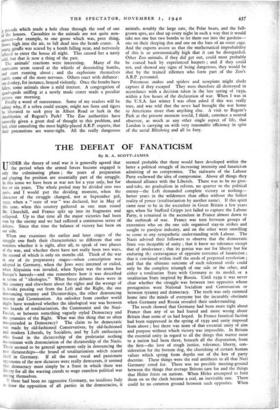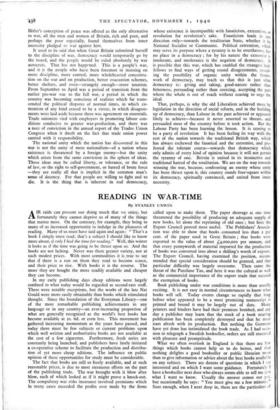THE DEFEAT OF FANATICISM
By R. A. SCOTT-JAMES UNDER the theory of total war it is generally agreed that the period when the armed forces become engaged is only the culminating phase ; the years of preparation and playing for position are essentially part of the struggle. In this sense we have been at war not for a year only, but for five or six years. The whole period may be divided into two parts, and I would put the dividing moment, when the character of the struggle changed, not at September 3rd, 1939, when a " state of war " was declared, but in May of this year, when this country gathered as one man round Mr. Churchill, and France split up into its fragments and collapsed. Up to that time all the major victories had been won by the enemy and we had suffered a continuous series of defeats. Since that time the balance of victory has been on our side.
When one examines the earlier and later stages of the struggle one finds their characteristics so different that one wonders whether it is right, after all, to speak of two phases of the war, and whether there have not really been two wars, the second of which is only six months old. Think of the war in any of its preparatory stages—when conscription was adopted in Germany, when the Jews were interned or exiled, when Abyssinia was invaded, when Spain was the arena for Europe's hatreds—and one remembers how it was described in terms of ideologies." What fierce debates there were in this country and elsewhere about the rights and the wrongs of it, books pouring out from the Left and the Right, the one denouncing tyranny and Dictatorships, the other denouncing tyraany and Communism. An onlooker from another world might have wondered whether the ideological war was between two brands of totalitarianism, the Communist and the Nazi- Fascist, or between something vaguely styled Democracy and the tyrannies of the Right. What was this thing that so often masqueraded as Democracy? The claim to be democratic was made by old-fashioned Conservatives, by old-fashioned and modern Liberals, by Socialists, and by Left enthusiasts who found in the dictatorship of the proletariat nothing inconsistent with denunciation of the dictatorship of the Nazis. Thz.re seemed to be general agreement only in denouncing the new dictatorships—the brand of totalitarianism which reared itself in Germany. If all the most vocal and passionate opponents of the new dictators were really democrats, it seemed that democracy must simply be a State in which there was liberty for all the warring creeds to wage ceaseless political war among themselves.
If there had been no aggressive Germany, no insidious Italy to draw the opposition of all parties in the democracies, it seemed probable that there would have developed within the latter a political struggle of increasing intensity and fanaticism admitting of no compromise. The stalwarts of the Labour Party eschewed the idea of compromise. Above all things they shunned alliance with the Liberals. There was to be no give- and-take, no gradualism in reform, no quarter to the political enemy—the Left demanded complete victory or nothing— better years in the wilderness than office without the fullest reality of power (totalitarianism by another name). If this spirit came near to be in the ascendant in Great Britain a few years ago, when Sir Stafford Cripps just failed to capture the Labour Party, it remained in the ascendant in France almost down to the outbreak of war. France was torn between groups of extremists who on the one side organised stay-in strikes and sought to paralyse industry, and on the other were unwilling to come to any sympathetic understanding with Labour. The Nazis advised their followers to observe that the democratic State was incapable of unity ; that it knew no tolerance except that of intolerance ; that its genius was not for liberty but for enduring th.t extravagance of opposite extremes of fanaticism ; that it contained within itself the seeds of perpetual revolution ; and that the ultimate outcome of such tolerated strife could only be the complete triumph of one side or the other, and either a totalitarian State with Germany as its model, or a totalitarian State inspired by Russia. Until 1939 it was never clear whether the struggle was between two opposites whose protagonists were National Socialism and Communism or between tyranny and democracy. The truth was only rammed home into the minds of everyone but the incurably obstinate when Germany and Russia revealed their understanding.
The result showed that Germany had been more right about France than any of us had feared and more wrong about Britain than some of us had hoped. In France fanatical faction had been suppressed in the spring of 1939 and unity imposed from above ; but there was none of that essential unity of aim and purpose without which victory was impossible. In Britain the essential unity in regard to all the things that matter most to a nation had been there, beneath all the disputation, from the first—the love of rough justice, tolerance, liberty, con- sideration for the bottom dog, the cherishing of certain human values which spring from depths out of the ken of party doctrine. These things were the real antithesis to all that Nazi Germany stood for. There was no possible meeting-ground between the things that average Britons care for and the things that Hitler foists on nations. When Hitler attempted to foist them on us the clash became a real, an inevitable one. There could be no common ground between such opposites. When Hitler's conception of peace was offered as the only alternative to war, all the men and women of Britain, rich and poor, and perhaps the poor especially, found themselves from inner necessity pledged to war against him.
It used to be said that when Great Britain submitted herself to the discipline of war, democracy would temporarily go by the board, and the people would be ruled absolutely by war autocrats. That has not happened. This is a people's war, and it is the people who have been foremost in insisting on more discipline, more control, more wholehearted concentra- tion on the war and on production, better evacuation schemes, better shelters, and even—strangely enough—more taxation. From September to April was a period of transition from the earlier pre-war war to the full war, a period in which the country was becoming conscious of realities which far trans- cended the political disputes of normal times, in which ex- tremism of any kind ceased to be a virtue, in which disagree- ments were laid aside because there was agreement on essentials. Trade unionists vied with employers in promoting labour con- ditions conducive to greater war-production, and there was a note of conviction in the annual report of the Trades Union Congress when it dwelt on the fact that trade union power carried with it responsibility.
The national unity which the nation has discovered in this war is not the unity of mere nationalism—of a nation whose existence is threatened by a foreign enemy—but the unity which arises from the same conviction in the sphere of ideas. Those ideas may be called liberty, or tolerance, or the rule of law, or the right to self-government, or hatred of brute force —they are really all that is implicit in the common man's sense of decency. For that people are willing to fight and to die. It is the thing that is inherent in real democracy, whose existence is incompatible with fanaticism, extremism, or revolution for revolution's sake. Fanaticism leads in one direction only—towards the totalitarian State, whether it be National Socialist or Communist. Political extremism, Which may serve its purpose where a tyranny is to be overthrown, has no place in a democracy ; for by his nature the extremist is intolerant, and intolerance is the negation of democracy. It is possible that this war, which has enabled the strangest bed- fellows to find ways of getting round disagreements, reveal- ing the possibility of organic unity within the frame- work of democracy, may teach us that this is just what democracy is : giving and taking, good-nature rather than bitterness, persuading rather than coercing, accepting the part where the whole is out of reach without ceasing to urge the ideal.
That, perhaps, is why the old Liberalism achieved more by legislation in the direction of social reform, and in the building up of democracy, than Labour in the past achieved or appeared likely to achieve—because it never resorted to threats, and persuaded most of the country before it took action. But the Labour Party has been learning the lesson. It is ceasing to be a party of revolution It has been feeling its way with the rest of the nation towards the traditional British way, which has always eschewed the fanatical and the extremist, and pre- ferred the tolerant course—towards that democracy which only admits of every kind of opinion because it will not permit the tyranny of one. Britain is united in its instinctive and traditional hatred of the totalitarian. We are on the way towards winning the war, because, confronting an enemy whose unity has been thrust upon it, this country stands four-square within its democracy, spiritually convinced, and united from inner necessity.







































 Previous page
Previous page